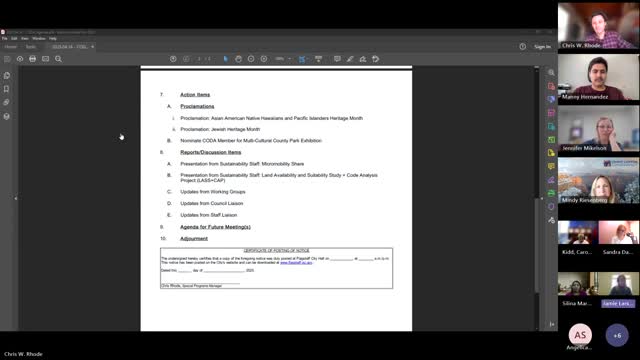Flagstaff staff seek public feedback on bringing e-scooters and e-bikes back to the city
Get AI-powered insights, summaries, and transcripts
Subscribe
Summary
City sustainability staff presented research on micromobility share — e-scooters and e-bikes — outlining benefits, risks and equity concerns and asking the Commission on Diversity Awareness for input before returning to City Council.
City of Flagstaff sustainability staff told the Commission on Diversity Awareness on April 16 that micromobility share — short-term public access to e-scooters and e-bikes — is already present in the city but that officials are weighing whether and how to allow private operators to return.
The presentation, led by Jamie Larson, housing and transportation VISTA, and Jenny Nieman, climate action section director, framed the issue as a policy choice rather than an immediate program start. “Micro Mobility Share is already here. We’re just simply discussing whether we want operators and businesses to come to Flagstaff,” Larson said.
Staff said the City Council asked staff in February 2025 to restart conversations about the program. Presenters summarized peer-city research showing environmental and congestion benefits and noted a 2023 National Association of City Transportation Officials finding that micromobility trips offset millions of pounds of carbon emissions nationally. The staff briefing highlighted potential advantages for Flagstaff: shorter local trips, reduced downtown parking pressure and first/last-mile connections to bus service.
At the same time, staff outlined key risks and management needs: personal-injury liability, device parking and clutter, enforcement of local rules on where devices may be ridden or parked, and staff time required to oversee contractors. Nieman described “geofence parking” technology as a common mitigation — virtual boundaries that require devices to be returned inside a prescribed area — and said companies commonly build that capability into their systems.
Commissioners focused on equity and implementation. Commissioner Selena Martinez urged prioritizing low-income and unhoused residents, noting some community members “rely on Mountain Line and those bus passes” and that micromobility should not exclude people who lack IDs or credit cards. Commissioner Sanchez asked for clearer cost data and recommended the procurement process require companies to propose low-cost or subsidized access; he said the headline membership numbers ($100–$300 per year) needed context about how many rides that covers. Several commissioners including Commissioner Hernandez and Commissioner Capela said they preferred awarding a single vendor contract initially to limit citywide clutter and ensure uniform management.
Staff described next steps: continued community engagement with commissions and community groups, vendor interviews, a public survey on the City’s engagement platform (Connect Flagstaff) timed to Earth Day outreach, and a return to City Council with two clear options in the fall — either an adoption path with a procurement/RFP or a direction to change city code to prevent vendor activity. If Council directs staff to proceed, staff said implementation would generally rely on a contractor to own and operate devices while the city enforces contract terms.
The discussion did not include a formal vote. Commissioners and staff agreed to keep equity, helmet access and accessible payment options central to planning and to provide input into the forthcoming survey and public meetings.
